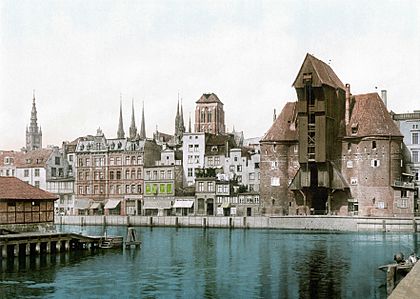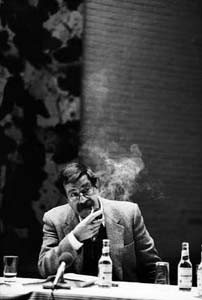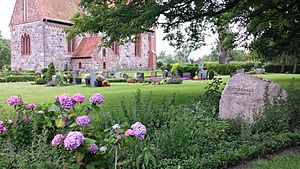Günter Grass facts for kids
Quick facts for kids
Günter Grass
|
|
|---|---|
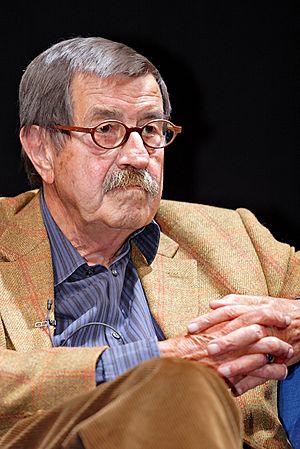
Grass in 2006
|
|
| Born | Günter Wilhelm Graß 16 October 1927 Danzig-Langfuhr, Free City of Danzig |
| Died | 13 April 2015 (aged 87) Lübeck, Germany |
| Occupation |
|
| Language | German |
| Period | 1956–2013 |
| Literary movement | Vergangenheitsbewältigung |
| Notable works |
|
| Notable awards |
|
| Spouse |
Anna Margareta Schwarz
(m. 1954; div. 1978)Ute Grunert
(m. 1979) |
| Signature | |
 |
|
| Military career | |
| Allegiance | |
| Service/ |
|
| Years of service | 1944–1945 |
| Battles/wars | World War II |
Günter Wilhelm Grass (born Graß; 16 October 1927 – 13 April 2015) was a famous German novelist, poet, and artist. He was also a playwright, illustrator, graphic artist, and sculptor. In 1999, he won the Nobel Prize in Literature, which is one of the highest awards for writers.
Grass was born in the Free City of Danzig (which is now Gdańsk, Poland). When he was a teenager, he was drafted into the army in late 1944 during World War II. He became a prisoner of war for a short time in May 1945. After the war, he trained as a stonemason and sculptor. Grass started writing in the 1950s. Many of his stories are set in Danzig, the city where he grew up.
He is most famous for his first novel, The Tin Drum (1959). This book is a key example of a writing style called magic realism, where magical things happen in a realistic world. The Tin Drum was the first book in his Danzig Trilogy. The other two books were Cat and Mouse and Dog Years. Grass often wrote about political ideas and supported the Social Democratic Party of Germany. The Tin Drum was even made into a movie in 1979, which won important awards like the Palme d'Or and the Academy Award for Best Foreign Language Film.
Contents
Early Life and Beginnings
Günter Grass was born in the Free City of Danzig on 16 October 1927. His father, Wilhelm Grass, was German and a Protestant. His mother, Helene Grass, was Catholic and had Kashubian-Polish roots. Günter was raised Catholic and was an altar boy when he was a child. His parents owned a grocery store in Danzig-Langfuhr (now Gdańsk-Wrzeszcz). He also had a younger sister named Waltraud.
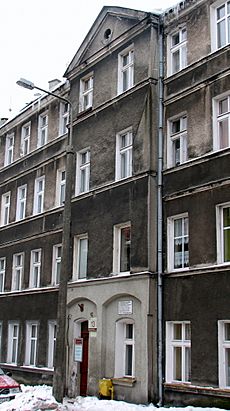
Grass went to a school called Conradinum in Danzig. In 1943, when he was 16, he became a Luftwaffenhelfer, which means an Air Force "helper." Soon after, he was drafted into the Reich Labour Service (National Labour Service). In November 1944, just after his 17th birthday, Grass wanted to join the Nazi Germany's submarine service. He wanted to escape what he felt was a boring life at home.
However, the Navy did not accept him. Instead, he was called to join the 10th SS Panzer Division Frundsberg in late 1944. Grass did not share this information until 2006. He served with this unit from February 1945 until he was wounded on 20 April 1945. He was captured in Marienbad (now Mariánské Lázně, Czech Republic) and sent to a US prisoner-of-war camp in Bad Aibling, Germany.
From 1946 to 1947, Grass worked in a mine and learned to be a stonemason. He then studied sculpture and graphic arts at the Kunstakademie Düsseldorf. He also helped start a group of writers called Group 47. Grass worked as a writer, graphic designer, and sculptor, and he traveled a lot. In 1953, he moved to West Berlin and continued his studies. From 1960, he lived in Berlin and also spent time in Schleswig-Holstein. In 1961, he spoke out against the building of the Berlin Wall.
From 1983 to 1986, he was the president of the Academy of Arts, Berlin.
His Amazing Books
The Danzig Trilogy
Grass's most famous book is The Tin Drum (Die Blechtrommel), which came out in 1959. It was later made into a movie by director Volker Schlöndorff in 1979. After The Tin Drum, he wrote Cat and Mouse (Katz und Maus) in 1961, which is a shorter novel. Then came the novel Dog Years (Hundejahre) in 1963.
These three books are known as the Danzig Trilogy. They focus on the rise of Nazism and how World War II affected Danzig. Danzig was a city that was separated from Germany after World War I and became the Free City of Danzig. Dog Years is like a follow-up to The Tin Drum, with some of the same characters. These books describe the different groups of people and the complicated history of the area.
The Tin Drum made Grass one of Germany's most important writers. When he won the Nobel Prize in Literature in 1999, the Nobel Committee said that The Tin Drum felt like a "new beginning" for German literature after many difficult years.
The Flounder
His 1977 novel The Flounder (Der Butt) is based on the old folktale "The Fisherman and His Wife". It explores the relationships between men and women. In the story, the magical flounder from the fairy tale, which represents male power, is caught by a group of feminists in the 1970s. They put it on trial. The book looks at how men and women have related to each other throughout history, through the story of the narrator and his wife.
My Century and Crabwalk
In 1999, Grass published My Century (Mein Jahrhundert). This book looked back at the many difficult historical events of the 20th century. He told these stories in short pieces, like a mosaic. In 2002, Grass became very well-known again with his book Crabwalk (Im Krebsgang). This shorter novel, which had a character from Cat and Mouse, was his most successful book in many years. It tells the story of a refugee ship full of thousands of Germans that was sunk by a Russian submarine during World War II, causing many deaths. This book was one of several works that explored the suffering of Germans during World War II.
Memoir Trilogy
In 2006, Grass released the first part of his autobiography, a series of three books. The first book was called Peeling the Onion (Beim Häuten der Zwiebel). It covered his childhood, his time during the war, his early work as a sculptor and poet, and finally, his success with The Tin Drum. In an interview before the book came out, Grass shared for the first time that he had been a member of the Waffen-SS. Before this, he had only said he was an anti-aircraft assistant. He explained that he needed to tell this part of his past, saying, "It was a weight on me, my silence over all these years is one of the reasons I wrote the book. It had to come out in the end."
This news caused a big discussion because Grass had often spoken out about Germany's past. Some people criticized him for not sharing this earlier. However, others defended him, saying he was very young when he was drafted. They also pointed out that he had always been critical of Germany's Nazi past after the war.
The second book in the series, The Box (Die Box), was published in 2008. The third, Grimms Wörter (Grimm's Words), came out in 2010.
Main Themes and Writing Style
A major theme in Grass's books is World War II and how it affected Germany and its people. He also looked at the ideas that supported the Nazi government. The city of Danzig/Gdańsk, with its unclear history between Germany and Poland, often stood for the mix of different ethnic groups. Grass himself had both German and Slavic family members.
His writing style mixes elements of magic realism. He often questions how stories are told by mixing real-life details from his own life with characters who might not be telling the whole truth, and with fantastic events. This creates irony or makes fun of events to criticize society.
Social and Political Involvement
For many years, Grass supported the Social Democratic Party of Germany and its policies. He often took part in political discussions in Germany and around the world. During Willy Brandt's time as chancellor, Grass was a strong supporter. Grass believed in slow, steady democratic changes. He wrote books that included his speeches and essays throughout his career.
In the 1980s, he became involved in the peace movement. He even visited Calcutta for six months. He published a diary with drawings from his trip.
When Germany was reunified in 1989–90, Grass argued that the two German states should remain separate. He worried that a united Germany might become aggressive again. This idea made many Germans disagree with him.
In 2012, Grass published a poem called "What Must Be Said" (Was gesagt werden muss) in several European newspapers. In the poem, he worried about Germany giving a submarine to Israel. He feared Israel might use it to launch nuclear weapons against Iran. He hoped people would demand that both Iran and Israel allow international experts to check their nuclear weapons. Because of this poem, Israel declared him persona non grata, meaning he was not welcome in that country.
Just a few days before he passed away, Grass finished his last book, Vonne Endlichkait. The title is in an old German dialect and means "About Finitude" or "About the End." The book combines short stories, poems, and his own pencil drawings. It was published in August 2015.
Awards and Honours
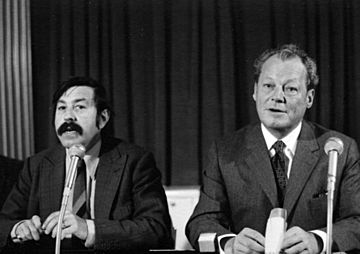
Grass received many international awards. In 1999, he won the highest literary honor: the Nobel Prize in Literature. The Swedish Academy praised him as a writer "whose frolicsome black fables portray the forgotten face of history." His writing is often seen as part of a German art movement that deals with "coming to terms with the past."
In 1965, Grass received the Georg Büchner Prize. In 1993, he became an Honorary Fellow of the Royal Society of Literature. He also received the Hermann Kesten Prize in 1995.
The city of Bremen helped create the Günter Grass Foundation. Its goal is to collect all of his many works, especially his personal readings, videos, and films. The Günter Grass House in Lübeck has exhibitions of his drawings and sculptures, along with an archive and a library.
In 1992, he received the Hidalgo Prize for defending the Romani and Sinti people. In 2012, he received the European of the Year award for his political discussions about Europe.
Waffen-SS Revelations
In August 2006, in an interview about his upcoming book, Peeling the Onion, Grass said that he had been a member of the Waffen-SS during World War II. Before this, people thought he was just one of the "Flakhelfer generation," meaning he was too young to fight much or be deeply involved with the Nazi regime beyond its youth groups.
On 15 August 2006, Spiegel Online showed three documents from 1946 from US forces that confirmed Grass's Waffen-SS membership.
After trying to volunteer for the submarine fleet in 1942 at age 15, Grass was drafted into the Reichsarbeitsdienst (Reich Labor Service). He was called up for the Waffen-SS in 1944. Grass was trained as a tank gunner and fought with the 10th SS Panzer Division Frundsberg until his unit surrendered to US forces.
In 2007, Grass wrote about his wartime experience in The New Yorker. He tried to explain the reasons that led him to enlist. He told the BBC in 2006: "It happened as it did to many of my age. We were in the labour service and all at once, a year later, the call-up notice lay on the table. And only when I got to Dresden did I learn it was the Waffen-SS."
Because Grass had been a strong critic of Germany's failure to deal with its Nazi past, his statement caused a big stir in the news. Some people, like historian Joachim Fest, said that his confession came "a bit too late." Others, like novelist John Irving, defended Grass. They said his membership was involuntary and happened when he was very young. They noted he had always been critical of Germany's Nazi past after the war.
Lech Wałęsa, a famous Polish leader, at first criticized Grass for keeping silent for 60 years. But he later changed his mind after reading Grass's letter to the mayor of Gdańsk. The ruling party of Poland, Law and Justice, asked Grass to give up his honorary citizenship of Gdańsk. However, the mayor of Gdańsk, Paweł Adamowicz, disagreed. He said it was not up to the city council to judge history.
Death
Günter Grass, who smoked a pipe for most of his life, died from a lung infection on 13 April 2015. He was 87 years old. He was buried in a private family ceremony on 25 April in Behlendorf, where he had lived since 1995.
American novelist John Irving gave the main speech at a memorial service for Grass on 10 May. Many important people attended, including German President Joachim Gauck and former Chancellor Gerhard Schröder. The mayor of Gdańsk, Paweł Adamowicz, said that Grass had "bridged the chasm between Germany and Poland" and praised the writer's strong beliefs.
See also
 In Spanish: Günter Grass para niños
In Spanish: Günter Grass para niños
- List of Nobel laureates in Literature
- List of people declared persona non grata
 | Lonnie Johnson |
 | Granville Woods |
 | Lewis Howard Latimer |
 | James West |


